Climate change: Slow progress in favor of climate displaced persons
States have the obligation to establish measures and actions to reduce risks. The World Bank estimates that by 2050 in Mexico there will be three million in this condition. Nations such as Italy and the US have references to this phenomenon in their internal regulations.





